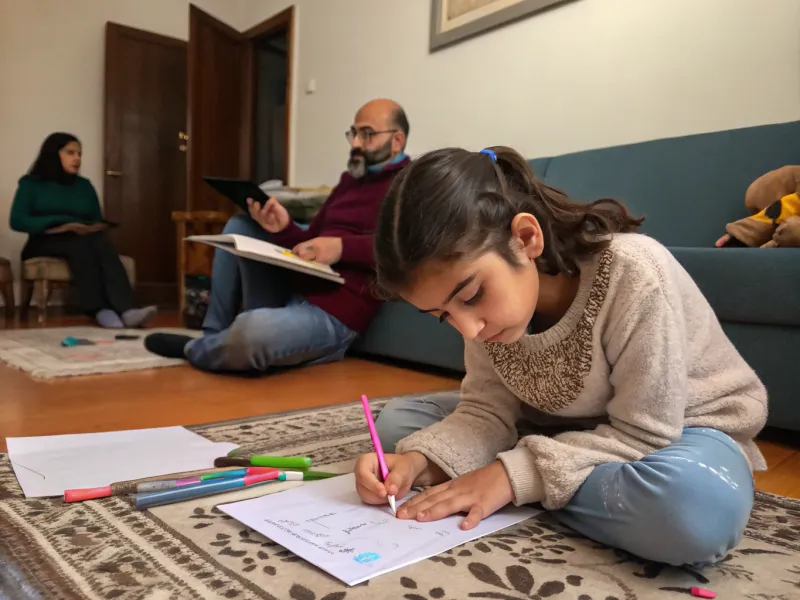22 Surprising Signs Your Childhood Was More Dysfunctional Than You Thought
Ever found yourself pondering over the quirks of your childhood? You know, those little things that seemed normal back then but now make you go, “Wait, what was that all about?” Today, we’re diving into the world of childhood experiences with a sprinkle of humor and a dash of empathy.
It’s all about those moments that might have been a bit more dysfunctional than we realized. Think of this as a friendly chat over coffee, where we laugh a little, reflect a bit, and maybe share an “aha” moment or two.
So, let’s jump into these subtle signs that your childhood might not have been as picture-perfect as it seemed. No judgment here, just a space to explore and understand!
1. Negligência emocional

Emotional neglect can be like wearing shoes a size too small—uncomfortable and hard to ignore, but somehow you managed. As a kid, maybe you didn’t get the hugs or words of comfort when needed. It wasn’t about not being loved; it was just not being expressed.
Talvez os seus pais estivessem presentes fisicamente, mas não ligados emocionalmente, o que o faz sentir-se um pouco como uma ilha.
Enquanto crescia, pode ter ignorado o facto, pensando que era normal. Mas, em adulto, apercebe-se do impacto na sua capacidade de expressar emoções e de se relacionar com os outros.
Understanding this doesn’t mean blaming anyone. It’s more about recognizing patterns that might have shaped who you are today. Acknowledging it can be the first step toward healing.
Maybe it’s time to give yourself the emotional support you missed back then. A warm hug, even if just from yourself, can be oddly comforting. Remember, it’s okay to seek out therapy or talk to friends who understand. You’re not alone, and opening up can be liberating.
2. Entrosamento

Oh, enmeshment, the invisible web that ties everyone a bit too closely. Imagine growing up in a family where everyone’s business was everyone’s business. Privacy? Never heard of it. Your thoughts, feelings, and even friendships might have felt like community property.
Nesses ambientes, a independência era um bem raro. As decisões eram frequentemente tomadas em grupo e o espaço pessoal era como um unicórnio mítico. Em criança, aprendemos a seguir a linha, misturando a nossa identidade com a dos que nos rodeiam. Agora, como adulto, desvencilhar-se desta teia pode ser como separar esparguete.
Realizing this pattern is the first step to creating boundaries. It’s okay to have your own thoughts and feelings. Practice saying “no” without guilt and explore what you genuinely enjoy. It might be daunting, but embracing your individuality is essential. And remember, there are others who understand this struggle.
3. Favoritismo parental

Ah, the classic tale of parental favoritism, where one sibling seems to hold the golden crown. Maybe your brother was the sports star, or your sister the academic genius. Meanwhile, you were left feeling like the understudy, waiting for your chance to shine.
This experience can seep into adulthood, fostering feelings of inadequacy and rivalry. You might even find yourself seeking validation in every little achievement. It’s like carrying an invisible scoreboard, always comparing yourself to others.
But here’s the truth: your worth isn’t defined by comparison. Acknowledging these feelings is crucial, and it might be time to redefine success on your terms. Celebrate your unique talents and remember that each sibling had their own challenges.
Healing might involve open conversations with family or seeking support from friends or a therapist. You’re more than enough just as you are.
4. Dinâmica familiar tóxica

Toxic family dynamics are like the storm clouds that never seem to clear. Arguments, silent treatments, and unpredictable moods might have been the norm. You learned to walk on eggshells, always anticipating the next eruption.
Crescer num ambiente assim ensina-o a ler a sala com precisão, mas muitas vezes à custa da sua própria paz. Agora, como adulto, estes padrões podem manifestar-se nas suas relações, tornando-o hiper-vigilante ou avesso a conflitos.
Recognizing these dynamics is the first step toward change. It’s okay to distance yourself from negativity and seek environments that nourish your well-being. Building healthy relationships takes time, and seeking professional help can provide guidance.
Lembra-te que mereces uma vida cheia de carinho e compreensão.
5. Falta de limites

Os limites na infância podem ter parecido linhas na areia, facilmente arrastadas pelas marés das exigências familiares. Quer se tratasse do seu quarto, dos seus pensamentos ou das suas amizades, nada parecia estar fora dos limites. O espaço pessoal era muitas vezes um luxo, não um direito.
As you grow, the absence of boundaries can lead to difficulties in asserting yourself. You might struggle to say “no,” fearing disappointment or conflict. It’s like living without a fence, leaving you vulnerable to the world.
But here’s the empowering part: you can build those boundaries now. Start by defining what feels comfortable for you and communicate it clearly. Practice makes perfect, and remember, saying “no” is a complete sentence. Building fences doesn’t mean you’re shutting others out; it’s about protecting your peace.
6. Expectativas irrealistas

Expectativas irrealistas podem ser como carregar uma mochila cheia de tijolos. Talvez se esperasse que se destacasse nos estudos, no desporto e nas competências sociais, tudo ao mesmo tempo. Tudo o que fosse menos do que a perfeição parecia um fracasso.
Na idade adulta, esta pressão pode manifestar-se como stress crónico e medo de cometer erros. A busca da perfeição pode ser esgotante, deixando pouco espaço para a auto-compaixão. Pode até achar que a alegria das conquistas é fugaz, perseguindo sempre o próximo objetivo.
A chave é reconhecer que a perfeição é uma ilusão. Aceite as suas imperfeições e aprenda a definir objectivos realistas. Comemore as pequenas vitórias e lembre-se de que o progresso é mais importante do que a perfeição.
Therapy or mindfulness practices can help reframe these expectations. You’re worthy, and it’s okay to forge your path.
7. Amor condicional

O amor condicional é como um sistema de recompensas, em que o amor e a aprovação são distribuídos em função dos resultados alcançados. Talvez só se sentisse amado quando se destacava na escola ou no desporto. Pode ter parecido que o amor era transacional, ligado às suas realizações.
This can lead to an endless pursuit of validation, leaving you questioning your self-worth. In adulthood, you might find yourself constantly seeking approval and fearing failure. It’s like being on a treadmill, never reaching the finish line.
The realization that love shouldn’t be conditional is a powerful awakening. Embrace your true self and seek relationships where love is given freely. Remember, you’re deserving of love just for being you. Therapy and self-reflection can aid in breaking these patterns and building healthier connections.
8. Volatilidade emocional

Emotional volatility can be like living on a roller coaster, never knowing when the next dip will come. Perhaps one moment was filled with laughter, and the next with tears or anger. Growing up in such an environment teaches you to be on guard, always ready for the next emotional storm.
These experiences might lead to emotional instability in adulthood, where mood swings feel overwhelming. You might struggle to trust your feelings, fearing they’ll spiral out of control.
Understanding this pattern is the first step in finding emotional balance. Practice mindfulness or seek professional guidance to help you navigate these emotions. Building a support system with friends who understand can provide stability. Remember, it’s okay to feel and express your emotions.
9. Disciplina baseada no medo

A disciplina baseada no medo pode dar a sensação de viver sob uma nuvem negra, sempre com receio de sair da linha. Talvez os castigos fossem severos ou imprevisíveis, deixando-o num estado constante de ansiedade. Esta abordagem pode ter moldado o seu comportamento, tornando-o cumpridor mas receoso.
As an adult, this might manifest as a fear of authority or difficulty asserting yourself. You may find yourself avoiding conflict at all costs, even when it’s necessary.
Reconhecer este padrão é essencial para o crescimento. Pratique a auto-compaixão e compreenda que os erros fazem parte da aprendizagem. Procure ambientes onde se sinta seguro para se exprimir. A terapia pode fornecer ferramentas para aumentar a confiança e a assertividade. Lembre-se, tem o direito de se defender.
10. Falta de apoio

A falta de apoio pode ser como aprender a andar de bicicleta sem rodinhas. Talvez tenha enfrentado desafios sozinho, sentindo que não havia uma rede de segurança. O apoio era escasso e aprendeu a ser autossuficiente, por vezes de forma insuficiente.
In adulthood, this might manifest as difficulty asking for help, fearing it shows weakness. You might even struggle with vulnerability, keeping others at arm’s length.
The first step is recognizing that seeking support is a strength, not a weakness. Build a network of friends or family who offer encouragement. Consider seeking professional guidance to explore these patterns. Remember, it’s okay to lean on others, and you don’t have to face everything alone.
11. Sobreprotecção

Overprotection can feel like living in a bubble, shielded from the world but also limited in exploration. Perhaps your parents were overly cautious, restricting your activities to keep you safe. While well-intentioned, this might have left you feeling unprepared for life’s challenges.
As an adult, you might struggle with decision-making or fear taking risks. The world can seem daunting when you’ve always been sheltered.
Recognizing this pattern is the first step toward independence. Embrace small challenges and learn from them. Build resilience by stepping out of your comfort zone. Remember, it’s okay to stumble; each experience is a lesson. You’re capable of navigating life’s complexities with confidence.
12. Envolvimento excessivo

O envolvimento excessivo pode dar a sensação de viver num aquário, constantemente observado e orientado. Talvez os seus pais estivessem muito envolvidos em todos os aspectos da sua vida, desde os trabalhos de casa até às suas amizades. Embora isso possa ter sido um apoio, também pode ter sido uma sensação avassaladora.
Na idade adulta, isto pode levar a uma falta de autonomia, lutando para tomar decisões sem orientação. Pode até dar por si a procurar aprovação para cada escolha, com medo de cometer um erro.
Recognizing this pattern can help you build independence. Practice making decisions on your own and trust your instincts. It’s okay to seek advice, but remember, you have the final say. Building confidence takes time, but each step is progress. You’re more capable than you realize.
13. Minimização dos sentimentos

Minimization of feelings can feel like having your emotions swept under the rug. Maybe when you expressed sadness or frustration, it was met with “It’s not a big deal” or “You’ll get over it.” Over time, you learned to suppress your feelings, believing they weren’t valid.
Isto pode levar a dificuldades de expressão emocional na idade adulta, com medo de ser julgado ou rejeitado. Poderá ter dificuldade em articular os seus sentimentos, mantendo-os reprimidos.
The first step is acknowledging that your feelings are valid and deserve to be expressed. Practice opening up to trusted friends or a therapist who understands. Remember, emotions are a natural part of being human, and sharing them can deepen connections. It’s okay to feel and be heard.
14. Papéis e regras pouco claros

A indefinição de papéis e regras pode ser como jogar um jogo sem conhecer as regras. Talvez as expectativas da família fossem inconsistentes ou estivessem constantemente a mudar, deixando-o inseguro quanto ao seu lugar. Esta situação pode ter gerado confusão e ansiedade, por estar sempre a adivinhar o que se esperava de si.
Na idade adulta, isto pode manifestar-se como dificuldade em estabelecer limites ou compreender as normas sociais. Pode dar por si a adaptar-se a diferentes papéis, tentando integrar-se sem se perder.
Recognizing this pattern is essential for building stability. Establish clear boundaries and communicate them effectively. Practice asserting your needs and understanding your role in relationships. Therapy can provide guidance in clarifying these dynamics. Remember, it’s okay to define your path and embrace who you are.
15. Conflitos parentais

Os conflitos parentais podem ser como viver numa zona de guerra, com as palavras como armas e o silêncio como escudo. Talvez os seus pais discutam frequentemente e você tenha sido apanhado no meio do fogo cruzado. Talvez tenha desempenhado o papel de mediador, tentando manter a paz.
Estas experiências podem levar a dificuldades nas relações, receando conflitos ou tornando-se demasiado complacente. Pode ter dificuldade em exprimir as suas necessidades, receando que isso conduza a discussões.
Understanding this pattern is the first step toward change. Practice open communication and set boundaries in relationships. Therapy can provide tools to navigate conflicts healthily. Remember, it’s okay to express your needs and seek harmony without sacrificing yourself.
16. Pressão de superação

A pressão do sucesso excessivo pode dar a sensação de estar numa roda de hamster, sempre a correr mas sem nunca chegar à meta. Talvez o sucesso tenha sido enfatizado e tudo o que não o fosse fosse considerado um fracasso. Talvez tenha sido encorajado a destacar-se em todas as áreas, desde a académica às actividades extracurriculares.
Na idade adulta, isto pode manifestar-se como stress crónico, procurando sempre a perfeição. Pode ter dificuldade em encontrar satisfação nas realizações, perseguindo sempre o próximo objetivo.
Recognizing this pattern is crucial for achieving balance. Set realistic goals and celebrate progress, not perfection. Practice self-compassion and understand that it’s okay to take a break. Therapy can provide support in navigating these expectations. You’re enough just as you are, and it’s okay to enjoy the journey.
17. Retirada de identidade

Dismissal of identity can feel like wearing clothes that don’t fit, always trying to mold yourself to others’ expectations. Perhaps your individuality was discouraged, with pressure to conform to family norms. You might have felt like your true self was hidden, afraid of disapproval.
Na idade adulta, isto pode levar a uma luta com a auto-identidade, procurando constantemente a validação dos outros. Poderá ter dificuldade em aceitar a sua singularidade, temendo ser julgado.
The first step is recognizing that your identity is valid and deserves to be expressed. Embrace your individuality and explore what genuinely brings you joy. It’s okay to stand out and be yourself. Therapy or self-reflection can aid in building self-acceptance. You’re unique, and that’s your strength.
18. Parentalidade incoerente

Inconsistent parenting can feel like trying to solve a puzzle with missing pieces. Perhaps rules and expectations varied, leaving you unsure of what was right or wrong. One day, a behavior was acceptable, and the next, it wasn’t.
This inconsistency can lead to anxiety and confusion in adulthood, always guessing others’ expectations. You might find it hard to trust your judgment, fearing you’ll make mistakes.
Recognizing this pattern is essential for building stability. Establish clear boundaries and communicate them effectively. Practice trusting your instincts and understanding your values. Therapy can provide guidance in navigating these challenges. Remember, it’s okay to define your path and embrace who you are.
19. Negligência dos talentos

A negligência em relação aos talentos pode ser como cantar num coro onde ninguém ouve a sua voz. Talvez as suas capacidades únicas tenham sido ignoradas e tenha faltado apoio. Talvez tenha sido encorajado a concentrar-se nos caminhos tradicionais, deixando as suas paixões por explorar.
In adulthood, this might lead to a lack of confidence in your abilities or fear of pursuing your dreams. You may struggle to believe in your talents, fearing they’ll go unnoticed.
The first step is recognizing that your talents are valuable and deserve attention. Explore your passions and seek environments that nurture your creativity. Therapy or mentorship can provide support in building confidence. Remember, it’s okay to shine in your own way and pursue what brings you joy.
20. Falta de comunicação

Lack of communication can feel like living in a house with walls but no windows. Perhaps conversations were rare, and emotions were unspoken. You might have learned to keep your thoughts to yourself, fearing they’d go unheard.
Na idade adulta, isto pode levar a dificuldades em expressar-se ou em estabelecer contactos. Poderá ter dificuldade em abrir-se, receando a vulnerabilidade.
The first step is recognizing that communication is a skill that can be cultivated. Practice expressing your thoughts and feelings with trusted friends or a therapist. Build connections by sharing experiences and listening actively. Remember, it’s okay to have a voice and to be heard. You’re not alone, and expressing yourself can lead to more meaningful relationships.
21. Parentification

Parentification is when the roles in the family quietly flip. Maybe you were the one comforting your parent after a tough day or managing responsibilities way beyond your years. While your peers were worried about school projects, you were handling emotions, finances, or household duties.
As a child, it might have felt like being needed. But in adulthood, it often translates into chronic over-responsibility, burnout, or feeling guilty when prioritizing your own needs. You may find it hard to relax or ask for help, always feeling like you have to “hold it all together.”
Recognizing this dynamic doesn’t diminish your strength—it honors the resilience you developed. But now, it’s okay to put the superhero cape down. Allow yourself rest, joy, and support. You deserve to be cared for, too. Healing starts with giving yourself the nurturing you once gave to others.
22. Passive-Aggressive Environment

Growing up in a passive-aggressive environment is like playing emotional charades—no one says what they mean, and you’re left guessing. Instead of direct conversations, feelings were expressed through sarcasm, silent treatments, or backhanded compliments.
As a kid, this might have made you second-guess everything. Now, you might struggle with confrontation, unsure how to express yourself honestly without fear or confusion.
It’s okay to unlearn those patterns. Direct, respectful communication is not only possible—it’s freeing. Practicing assertiveness and setting emotional boundaries can help you feel more confident and connected. And remember, it’s not rude to speak your truth; it’s actually incredibly kind—to yourself and others.







